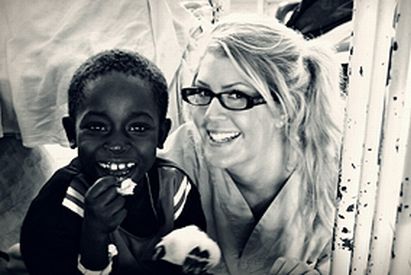Nursing half a world away
By George Belanger, Dayna St. Arnault & Brittany Collins
At 5:30 a.m. the rooster calls [literally], and we begin our day as fourth year nursing students in Ghana. Shortly after the early morning begins we usually catch a ride with Kofi, a driver from the University of Ghana to the 37 Military Hospital located just outside of central Accra. The commute from our residence [International Student Hostel] to the hospital is approximately forty minutes, often varying on account of unforeseen traffic congestion. Upon arrival at 37 Military Hospital, the ten students in our group disperse to various units ranging from Obstetrics, Emergency, Intensive Care, Paediatrics, Surgery and Public Health.

Staff quickly came to accept our presence and embraced our desire to practice within their interdisciplinary healthcare team. The challenges we faced as healthcare professionals were vast on account of our unfamiliarity with the Ghanaian healthcare system, and our immersion in a new and dynamic culture. In addition to this, the military structure of the hospital led to some confusion, primarily in regard to the hierarchy in place among military staff and civilian healthcare professionals. Overtime we adapted to our environment and conquered the many challenges we faced.
Student experiences while at 37 Military are too extensive, individualized and complex to effectively describe; however, all experiences have provided great value to the learning process and unique opportunities for professional development. Clinical placements at 37 Military were allotted from Monday through Thursday, usually concluding in the afternoons leaving plenty of time for cultural experiences back at the international hostel.
Tro-tro’s, a form of freighting yet oddly reliable transportation typically got us to our campus destination. Evenings on campus consisted of many social experiences such as walks to the market, drumming lessons, campus recreation, and conversation with the multitude of international and local students.
Meals were a culinary delight for some and a gastrointestinal nightmare for others. Food selection on campus was limited to the staple food items of rice, egg, bread, fruit, and chicken while other areas of Accra and Ghana provided a variety of other alternatives. The fresh fruit was a delight!
Fridays were reserved for community experiences such as visit to psychiatric hospitals, orphanages, rural villages and herbal research facilities. While weekends were spent on leisure activities such as trips to sandy beaches, national parks, and in one instance a fun yet necessary excursion to the wonderful neighboring country of Togo.
The final two weeks of our undergraduate degree involve community work in the outlying city are of Madina, which will undoubtedly provide us with many more learning opportunities. Ultimately, our experience in Ghana has been wonderful, we have learned a great deal, experienced so much and most importantly come to realize the importance of developing into global citizens.